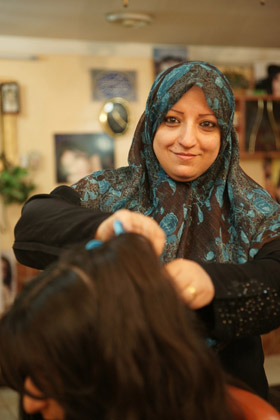
As the U.S. Senate undergoes confirmation hearings on President Barack Obama's nominees for his new foreign policy team, we can expect many of the questions to revolve around what will become one of their biggest challenges: bringing stability to the Middle East. As difficult and intractable as the problems may seem, one of the surest building blocks for stability is investment in businesses and enterprises that will generate jobs and economic growth from the ground up.
While political instability across the Middle East has long kept investors at bay, the unprecedented social and political transformation taking place in the region also offers tremendous new opportunities. The middle and lower income classes can be a key to creating more equitable economies in the future if they are provided with access to credit, and the means to utilize their entrepreneurial talents in building and expanding the "missing middle" enterprises. Elissa McCarter of CHF International reports that "In developed countries, small and medium enterprises (SMEs) contribute to over half of gross domestic product and 57 percent of total employment... The Middle East and North Africa region lags far behind other regions [in this area, and regional SMEs remain]... grossly underserved [and are] starved for capital to meet investment and expansion plans."
Global Communities (formerly CHF International), which has developed vast experience in development finance in the Middle East since the mid-1990s, worked in partnership with the Overseas Private Investment Corporation (OPIC) and local banks in the West Bank to provide access to commercial bank credit, with OPIC providing loan guarantees to our partner banks, incentivizing the banks to lend to worthy small- and medium-sized enterprises that could create jobs and generate income. Because of the success of that program, OPIC, the United States Agency for International Development and Global Communities are now replicating such loan guarantee facilities in Jordan and Egypt, investments which, where market appropriate, also include training for local entrepreneurs and bank loan officers alike. This modest investment of public money can unlock hundreds of millions of dollars in private investment.

In the Middle East region, microfinance can also play an important catalytic role in spurring equitable economic growth. With the largest network of microfinance institutions in the region, Global Communities has seen first-hand the kind of robust and impressive results that can stem from limited initial investment. Since 2004, Global Communities has been able to disburse more than $620 million in small loans to more than 260,000 people, helping to create more than half a million new jobs across a broad spectrum of the economy, creating a larger and stronger middle class and reducing income inequality.
In many countries in the Middle East, past private foreign investment has largely benefited the elite privileged classes. The middle and lower income classes have been largely left out, and the markets have been distorted by donor and government subsidies. Moreover, the lack of good legal frameworks to enable more commercially-oriented microfinance has stymied the ability of banks and other finance institutions to provide necessary credit to assist working class entrepreneurs. In our experience in the region, our microfinance clients have proven to be loyal, resilient and bankable, continuing to build their lives and livelihoods through war, economic stagnation, regime change and more. Despite challenges, they repay their loans (our repayment rates are consistently above 98 percent) and value the consistent access to financing that has enabled them to continue expanding their small businesses. These people, who represent the vast majority of the region's population, are the future of their countries.
Yet in order to significantly expand these activities, and thereby expand economic opportunities, private investment is a must. President Obama and his foreign policy team can help by highlighting opportunities for private investment and by working with regional policy-makers to encourage a climate more conducive to investment. This would mean advising on creating the right regulatory framework to open markets, and to better enable microfinance to serve the lower income strata of the population.
For so many of the peoples of the Middle East who have supported the "Arab Awakening," their frustration has only partly been because of disenfranchisement from their political systems. They have also been economically disenfranchised. Their aspirations are to provide a better life for their families, have the security of their own home and a job or a business that will translate to hope for a better future for their children. Investing in the working class in this region is a key ingredient in bringing stability to the region and ending the cycle of disappointment and disillusionment that so often leads to ideological extremes and violence. At a time when the perceived turmoil in the region is so easily seen as a disincentive to invest, the smart money must recognize the opportunity before us of a region hungry to build a better future.
